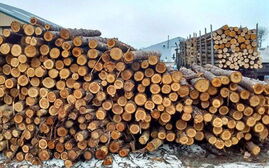
Maine trade conference hails ‘ancient future’ industries for innovation, resilience
 Photo / Laurie Schreiber
Luke Holden discussed the heritage lobster industry at Maine International Trade Center’s Trade Day 2024.
Photo / Laurie Schreiber
Luke Holden discussed the heritage lobster industry at Maine International Trade Center’s Trade Day 2024.
Maine’s heritage industries — enduring through decades and even centuries — demonstrate how to innovate and stay relevant amid change and how to be resilient amid challenges.
That was the central message from speakers during Maine International Trade Center’s Trade Day 2024, held May 16-17 in Bangor. The theme was “Evolution: The Future of Maine’s Heritage Industries.”
The conference noted that for centuries, the state’s economic growth and global competitiveness came from the agriculture, forest products, seafood, shipbuilding and textile industries, all based on Maine’s natural resources.
Those heritage industries have experienced significant changes over the last two decades through advances in manufacturing processes and improved technology, including development of new products such as clothing made from forest products and heat-resistant textiles used in space.
There are now plenty of similar opportunities for Maine businesses, speakers said.
“When we talk about innovation, people think about the latest and greatest app,” said Wade Merritt, Maine International Trade Center’s president.

That’s not the case when it comes to industries based on natural resources that have built on decades and, in some cases centuries, of what Maine does.
But the industries cannot rest on their laurels.
“Innovation is required for international success and international success supports innovation,” Merritt said. “It’s a virtuous circle.”
Merritt introduced the phrase “ancient future” technology — industries that have proven sustainable through their ability to innovate.
“Heritage industries have seen challenges,” he said. "But also we can’t solve our problems with the same thinking that we used when we created them.”
Industry collaboration
Luke Holden of Luke's Lobster said the lobster industry is an example of those ideas.
Holden is a third-generation lobsterman from Cape Elizabeth. With the help of his father Jeff Holden, a lobsterman and Maine’s first licensed lobster processor, and later joined by his brothers Bryan and Mike, Holden in 2009 launched Luke’s Lobster, a vertically integrated seafood business.
Today, Luke’s Lobster has investments in Maine wharfs and coops, a seafood production facility, ecommerce and consumer packaged food businesses. The company has grown its restaurant business beyond its founding city of New York City, across the U.S. and to international markets.
The lobster industry has faced substantial challenges, particularly over the last five years, Holden said. The obstacles include the Gulf of Maine’s warming waters, which appears to be affecting lobster biomass; increased costs and workforce shortages in the fishery; and regulatory disputes related to the endangered North Atlantic right whale.
“How do you take all of these challenges and say there’s a bright future for this heritage fishery?” Holden said.
The industry’s resilience through generations offer hope, he continued. He cited the industry’ ability to collaborate to address problems and to innovate for new solutions, such as development of ropeless fishing gear, envisioned as a way to avoid potential interactions between vertical fishing lines and whales.
“We have a lot of big issues that have come about and will come about,” Holden said. “But I think this group of stakeholders is ultimately rolling in the same direction with incredible fortitude and resilience.”
Threading the needle
Maine could do a better job telling the story of how heritage industries “thread the needle” between conservation and innovation, such as the development of novel wood construction materials, said Claire Hawkins, director of natural resource markets and economic development at the Maine Department of Agriculture, Conservation and Forestry.

“There’s so much we have to share with the world,” Hawkins said.
Hawkins’ expertise in market research and strategy includes 10 years in the private sector, working with Fortune 500 clients on projects related to market access and capture, competitive advantage, product development and consumer engagement.
“One of the hallmarks of heritage industries is that they’ve been around long enough to see some pretty big upsets,” she said.
Climate change has emerged as one of those major upsets, she added.
“A lot of our work has focused on identifying challenges and opportunities that heritage industries face,” while also identifying, securing and innovating resources to support them, she continued.
An interesting aspect of heritage industries, she said, is that the end goal of those businesses is not the exit of its ownership but passing them along to the next generation.
“So from the economic development perspective, agencies and private capital sometimes don’t fit perfectly with the trajectory of these businesses,” she said. “It takes lot of creative and thoughtful engagement.”
Maine has the opportunity to use the sustainability angle to promote its heritage industries domestically and overseas, said Hawkins.
“When we engage in global communication, we have a lot to offer,” she said.
A place of strength
Some heritage industries are based on Maine’s own natural resources; others aren’t.
One company, Edward H. Best & Co. in Thomaston, is part of the heritage textile industry but sources much of its fiber from outside of Maine.

The company produces endlessly woven wool and synthetic textiles for applications around the globe, ranging from products used in the production of automotive tires to wallpaper and laundry pods.
The products have been produced on the same lines in Maine for more than 135 years.
“For us, sourcing locally would be great,” said David Erb, the company’s president.
A startup making biobased molded packaging is well positioned for getting raw wood in Maine.
“That segues into what make Maine a place of strength in terms of natural resources,” said Melissa LaCasse, CEO and co-founder of Tanbark Molded Fiber in Saco.

A high-end boatbuilding company in East Boothbay has a 200-year history of innovation and sustainability.
“There have been times over our history when we’ve been involved in more advanced technology and less advanced technology than what we do right now,” said Audrey Hodgdon, managing director of Hodgdon Tenders, a division of Hodgdon Yachts, founded in 1816.
Hodgdon Tenders makes 30-foot to 40-foot luxury tenders for the superyacht market, which helps drive global sales. A tender is a smaller boat that supports a larger vessel — for example, transporting owners and guests between the vessel and shore.
Hodgdon Yachts has proven its ability to evolve over the course of more than 200 years, with the development of new construction methods, materials, designs, markets and types of boats, Hodgdon noted.

“We’ve been bigger at times, smaller at times,” she said. “I’m sure all of that will continue to evolve.”
She continued, “Being a family-owned business with such a long legacy, you’re motivated to keep this thing going no matter what it takes, even if that means reinvention.”














0 Comments